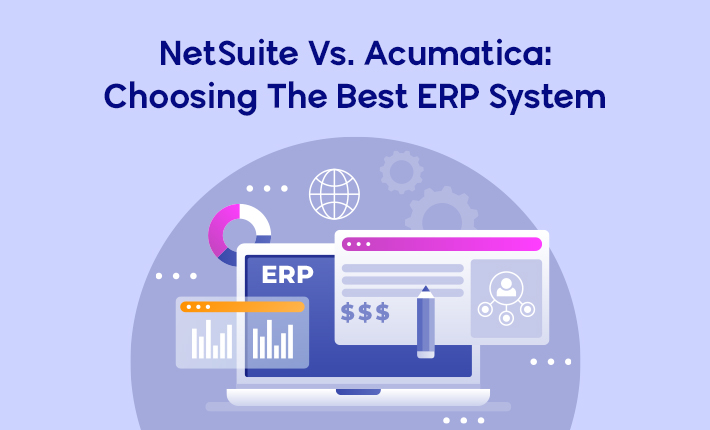Selecting the right enterprise resource planning (ERP) system is crucial for businesses to streamline their operations and drive growth. When comparing ERP options, NetSuite and Acumatica are often considered leading contenders. In this article, we will conduct a comprehensive comparison between NetSuite and Acumatica, focusing on key factors such as functionality, scalability, cloud capabilities, customization, industry specialization, and customer support. By understanding the strengths and differences of these two platforms, businesses can make an informed decision about which ERP system best aligns with their specific needs and goals.
1. Functionality and Integration: Both NetSuite and Acumatica offer a broad range of functionalities to support core business processes. NetSuite provides a fully integrated suite that covers financial management, inventory management, order management, CRM, human resources, and more. Acumatica also offers comprehensive functionality, including financials, distribution, manufacturing, project management, and CRM. Both platforms support integration with third-party systems and provide application programming interfaces (APIs) for seamless data exchange. However, NetSuite's integration capabilities and pre-built connectors are more extensive, making it easier to integrate with external applications and systems.
2. Scalability and Flexibility: Scalability is a crucial consideration for businesses planning long-term growth. NetSuite is known for its scalability, accommodating businesses of all sizes, from small startups to large enterprises. It can handle increased transaction volumes, user growth, and additional functionalities as businesses expand. Acumatica also offers scalability, but it may require additional configuration and customization to meet the specific needs of larger organizations.
3. Cloud Capabilities: Both NetSuite and Acumatica are cloud-based ERP systems, offering the benefits of accessibility, flexibility, and reduced IT infrastructure costs. However, NetSuite has a more established cloud infrastructure, having been a cloud-native solution since its inception. NetSuite's cloud platform is highly reliable and provides global data centers for improved performance and data security. Acumatica's cloud capabilities have improved over time, but it initially started as an on-premises solution and later transitioned to the cloud. As a result, NetSuite generally offers a more mature and robust cloud experience.
4. Customization and Configuration: Customization options are essential for tailoring the ERP system to meet specific business needs. NetSuite provides extensive customization capabilities, including the SuiteCloud development platform, SuiteBuilder, and SuiteFlow. These tools allow businesses to customize workflows, create new fields and forms, and develop custom applications. Acumatica also offers robust customization capabilities, including customization projects, custom screens, and dashboards. However, some users find NetSuite's customization options more flexible and user-friendly.
5. Industry Specialization: NetSuite and Acumatica cater to a broad range of industries, but there are differences in their industry focus. NetSuite has a strong presence across industries, including manufacturing, wholesale distribution, retail, professional services, and e-commerce. It offers industry-specific features and functionality tailored to the unique needs of these sectors. Acumatica also serves multiple industries, with a particular focus on manufacturing, distribution, construction, and services. Acumatica's modular structure allows businesses to select industry-specific editions that align with their requirements. The choice between NetSuite and Acumatica may depend on the specific industry requirements and the depth of industry-specific functionality needed.
6. Customer Support and Community: Both NetSuite and Acumatica prioritize customer support. NetSuite offers comprehensive customer support through its dedicated support team, consultants, and extensive online resources. Acumatica also provides customer support, including technical assistance, training materials, and user forums.
7. Pricing and Total Cost of Ownership: Pricing and the total cost of ownership (TCO) are critical factors in choosing an ERP system. NetSuite's pricing is typically based on a subscription model, with costs varying based on the selected modules, user count, and business size. Acumatica follows a similar pricing model, but it also offers a perpetual license option for on-premises deployment. The overall TCO will depend on factors such as implementation costs, customization requirements, ongoing maintenance, and support expenses. It's important for businesses to carefully evaluate their specific needs, projected growth, and budget constraints to determine which system provides the best value over the long term.
8. Integration with Third-Party Applications: Both NetSuite and Acumatica offer integration capabilities with third-party applications. NetSuite provides a wide range of pre-built connectors and integrations through SuiteCloud, enabling seamless integration with popular applications such as CRM systems, e-commerce platforms, and productivity tools. Acumatica also supports integrations through its REST-based API and provides connectors for various applications. However, the availability and breadth of pre-built integrations are generally more extensive with NetSuite.
9. Mobile Accessibility: In an increasingly mobile business environment, mobile accessibility is crucial for on-the-go access to critical business data. NetSuite offers dedicated mobile applications for iOS and Android, providing users with the ability to perform tasks, access dashboards, and make informed decisions from their mobile devices. Acumatica also offers a mobile application, allowing users to access key functionalities and data remotely. Both platforms provide mobile accessibility, but NetSuite's mobile application is often considered more feature-rich and user-friendly.
Conclusion:
Choosing between NetSuite and Acumatica depends on various factors, including specific business requirements, scalability needs, customization preferences, industry focus, customer support expectations, and budget considerations. NetSuite offers a fully integrated suite, robust scalability, a mature cloud infrastructure, extensive customization options, and a strong industry presence. Acumatica provides comprehensive functionality, flexibility, customization capabilities, and industry-specific editions. Ultimately, businesses should evaluate their needs and priorities carefully, consider the strengths and weaknesses of each platform, and potentially explore demos or trials to make an informed decision on which ERP system best suits their unique business requirements.















Post Comments